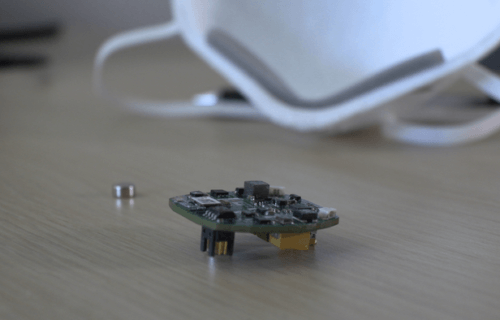EVANSTON, Ill. — A smart sensor the size of a quarter can turn an ordinary face covering into an all-in-one health monitor, a team of Northwestern University engineers says. Their invention, which they call a “Fitbit for the face,” uses a magnet to attach to any N95, cloth, surgical face mask people wear throughout their day.
The “FaceBit” allows a person to keep track of their respiration rate, heart rate, and even mask wear time through a smartphone app which receives wireless signals from the chip. Study authors say the FaceBit can alert users to potential problems in real-time, such as an elevated heart rate or other breathing problems. Moreover, the sensor can detect problems with a user’s face mask, like a poor fit or air leak somewhere in the covering.
FaceBit runs on the heat of your breath!
Engineers say their device harvests energy from a very unlikely source — the user! Along with a tiny battery, the chip takes in energy from ambient sources like the wearer’s movements and even the heat of their breath. This limits the need to charge the FaceBit and keeps the battery fresh longer.
“We wanted to design an intelligent face mask for health care professionals that does not need to be inconveniently plugged in during the middle of a shift,” says Northwestern’s Josiah Hester, who led the device development, in a university release. “We augmented the battery’s energy with energy harvesting from various sources, which means that you can wear the mask for a week or two without having to charge or replace the battery.”
Tests on the FaceBit found that it performs with about the same accuracy as clinical-grade devices and can last for more than 11 days before needing a re-charge.

The device knows if your mask doesn’t fit right
Hester’s team started their research for this project by interviewing doctors and nurses who constantly have to wear a well-fitting face mask. Health care professionals regularly have to go through a 20-minute “fit test” to make sure their N95 masks provide a proper seal on their faces.
These tests use cumbersome machines that pump in aerosol mists that allow wearers to check for leaks. While the FaceBit can’t replace these tests, it is able to warn users if the mask isn’t fitting tightly by sending an alert to their phone.
“If you wear a mask for 12 hours or longer, sometimes your face can become numb,” Hester says. “You might not even realize that your mask is loose because you cannot feel it or you are too burnt out to notice. We can approximate the fit-testing process by measuring mask resistance. If we see a sudden dip in resistance, that indicates a leak has formed, and we can alert the wearer.”
Tiny motions reveal your heart rate
As for the real-time health data FaceBit can track, researchers say the device can sense subtle motions everyone makes as they breathe. The team notes that every time a person’s heart beats, their head moves by an almost unrecognizable amount. The smart chip uses this movement to calculate heart rate.
“Your heart is pushing a lot of blood through the body, and the ballistic force is quite strong,” Hester explains. “We were able to sense that force as the blood travels up a major artery to the face.”
The FaceBit also knows that stressful events can cause people to breathe heavily. When it detects the signs of rapid breathing, the device can use the information to alert the wearer that it might be time to take a break and calm down.
Hester hopes the next version of the FaceBit will be battery-free, using just the wearer’s body heat and the Sun to power it. At the moment, the FaceBit still needs to undergo clinical trials before it can enter the market.
“FaceBit provides a first step toward practical on-face sensing and inference, and provides a sustainable, convenient, comfortable option for general health monitoring for COVID-19 frontline workers and beyond,” Hester concludes. “I’m really excited to hand this off to the research community to see what they can do with it.”
The details of the FaceBit are published in the journal Proceedings of the ACM on Interactive, Mobile, Wearable and Ubiquitous Technologies.
